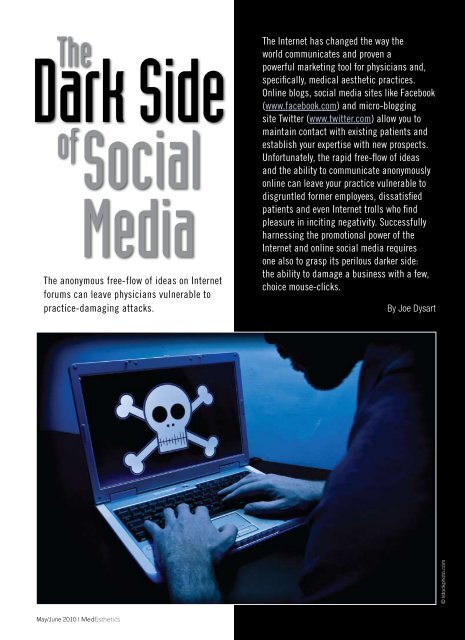The Dark Side of Social Media - MedEsthetics
The Dark Side of Social Media - MedEsthetics
The Dark Side of Social Media - MedEsthetics
Create successful ePaper yourself
Turn your PDF publications into a flip-book with our unique Google optimized e-Paper software.
<strong>The</strong><br />
<strong>Dark</strong> <strong>Side</strong><br />
<strong>of</strong><br />
<strong>Social</strong><br />
<strong>Media</strong><br />
<strong>The</strong> anonymous free-flow <strong>of</strong> ideas on Internet<br />
forums can leave physicians vulnerable to<br />
practice-damaging attacks.<br />
<strong>The</strong> Internet has changed the way the<br />
world communicates and proven a<br />
powerful marketing tool for physicians and,<br />
specifically, medical aesthetic practices.<br />
Online blogs, social media sites like Facebook<br />
(www.facebook.com) and micro-blogging<br />
site Twitter (www.twitter.com) allow you to<br />
maintain contact with existing patients and<br />
establish your expertise with new prospects.<br />
Unfortunately, the rapid free-flow <strong>of</strong> ideas<br />
and the ability to communicate anonymously<br />
online can leave your practice vulnerable to<br />
disgruntled former employees, dissatisfied<br />
patients and even Internet trolls who find<br />
pleasure in inciting negativity. Successfully<br />
harnessing the promotional power <strong>of</strong> the<br />
Internet and online social media requires<br />
one also to grasp its perilous darker side:<br />
the ability to damage a business with a few,<br />
choice mouse-clicks.<br />
By Joe Dysart<br />
© Istockphoto.com<br />
May/June 2010 | <strong>MedEsthetics</strong>
<strong>The</strong> <strong>Dark</strong> <strong>Side</strong> <strong>of</strong> <strong>Social</strong> <strong>Media</strong><br />
Bruce Arnold, founder <strong>of</strong> Caslon Analytics (www.caslon.com.<br />
au), a Web marketing firm that counsels clients on managing<br />
business reputations online, notes that, no company or<br />
pr<strong>of</strong>essional is safe from the dark side <strong>of</strong> social media. But<br />
medical practitioners can reduce the risks to their practices<br />
by developing a reputation management strategy to catch<br />
potentially damaging posts before they gain momentum.<br />
Such monitoring is especially critical to medical aesthetic<br />
practices, since so many <strong>of</strong> your patients are within the demographics<br />
<strong>of</strong> individuals who most <strong>of</strong>ten visit social forums.<br />
<strong>The</strong>y are educated, mid- to upper-income, highly articulate<br />
Web users who have well-founded opinions, and they are not<br />
afraid to express those opinions. Fortunately, there are a number<br />
<strong>of</strong> tools and service providers to help business owners guard their online image.<br />
Do-It-Yourself Monitoring<br />
One <strong>of</strong> the easiest ways to track what’s being said about your business on the<br />
Internet is to regularly monitor the major online communities, mailing lists and<br />
blogs—all places where those looking to shape public opinion tend to congregate.<br />
<strong>The</strong> first step in the process is to sign up for Google Alerts (www.google.com/<br />
alerts), a service that enables you to track online mentions <strong>of</strong> your pr<strong>of</strong>essional<br />
and/or practice name, including mentions on YouTube. You’ll also want to sign up<br />
for an account on Twitter to monitor the posts there. Signing up for an account<br />
on Twitter will also prevent someone else—including a dissatisfied patient, competitor<br />
or former employee—from grabbing your brand name and masquerading<br />
as a company representative.<br />
Meanwhile, you can track blog posts with the free blogwatch service Technorati<br />
(www.technorati.com), which has been around for several years—ever since the<br />
blog phenomenon went large. It does a great job <strong>of</strong> monitoring what’s being said in<br />
the blogosphere and keeping track <strong>of</strong> newly created blogs. Boardtracker.com (www.<br />
boardtracker.com), a free service that monitors buzz on the countless discussion<br />
boards on the Web, is another essential do-it-yourself monitoring tool.<br />
It’s also a good idea to keep tabs on anything that may be cropping up about<br />
your business on podcasts. PodcastAlley (www.podcastalley.com) <strong>of</strong>fers an excellent<br />
overview <strong>of</strong> what’s going on in that space. Other free reputation management tools<br />
include BlogPulse (www.blogpulse.com) that tracks blog posts; Keotag (www.keotag.<br />
com) used to track keywords, including business names that are being used as info<br />
tags on the Web; SeekingAlpha (www.seekingalpha.com/tag/<br />
transcripts) tracks the postings <strong>of</strong> conference call transcripts<br />
on websites; Yahoo’s Upcoming (www.upcoming.yahoo.com/)<br />
tracks notices <strong>of</strong> upcoming conferences by keyword; Google<br />
Trends (www.google.com/trends) tracks the most popular<br />
keyword searches on the Web; and Compete (www.searchanalytics.compete.com/site_referrals/)<br />
tracks the top website<br />
referrals for any keyword search.<br />
Reputation Management Service Providers<br />
If do-it-yourself daily monitoring becomes overwhelming, services<br />
like BlogSquirrel by CyberAlert (www.cyberalert.com/<br />
blogmonitoring.html) will automatically monitor blog postings<br />
containing your name, practice names and/or other keywords,<br />
and send you daily reports about those postings via email. <strong>The</strong><br />
BlogSquirrelis a monitoring program that<br />
tracks blog postings.<br />
Given clear<br />
instruction on how<br />
to share complaints,<br />
angry patients<br />
are less likely<br />
to vent their<br />
frustrations through<br />
online forums.<br />
Factiva Insight: Reputation Intelligence<br />
will monitor your company’s reputation<br />
across virtually all media.<br />
May/June 2010 | <strong>MedEsthetics</strong>
<strong>The</strong> <strong>Dark</strong> <strong>Side</strong> <strong>of</strong> <strong>Social</strong> <strong>Media</strong><br />
service <strong>of</strong>fers you tools to ensure that<br />
you receive fewer alerts about posts you<br />
consider irrelevant. Plus, you can maintain<br />
a digital clip book with the service,<br />
which you and other appropriate staff<br />
members can refer to when necessary.<br />
Webclipping.com (www.webclipping.com),<br />
a long-established service,<br />
will track what’s being said about your<br />
business on the Internet, keep you<br />
apprised <strong>of</strong> competitors’ activities, and<br />
send alerts about copyright or trademark<br />
abuses.<br />
Nielsen Online (www.nielsen-online.<br />
com) monitors blogs as well as postings<br />
and activity throughout all social media<br />
forums, including discussion boards,<br />
YouTube, Facebook and the like. Nielsen<br />
Online also combines the auto-monitoring<br />
<strong>of</strong> blogs with human analysis to help<br />
companies avoid potential PR nightmares.<br />
One especially interesting feature: Its<br />
s<strong>of</strong>tware is programmed to include analysis<br />
<strong>of</strong> “natural language,” so you have the<br />
ability to track positive or negative posts<br />
about your business, even if those posts<br />
are rendered in poor grammar.<br />
Factiva Insight: Reputation Intelligence<br />
(www.factiva.com/factivainsight/<br />
reputation) <strong>of</strong>fers a more comprehensive<br />
look by monitoring what’s going<br />
on with your brand across virtually all<br />
media. Offered as a joint venture <strong>of</strong> Dow<br />
Jones and Reuters, Factiva tracks company<br />
mentions in mainstream media,<br />
radio and TV, and in posts on websites,<br />
blogs and discussion groups. <strong>The</strong> firm<br />
also employs a “reputation analysis tool”<br />
that automatically sifts through all the<br />
mentions <strong>of</strong> your company and churns<br />
out reports about potential problem<br />
areas. Reputation Intelligence can also<br />
portray such public opinion data in<br />
graphical form for easier company-wide<br />
dissemination.<br />
Addressing Negative Posts<br />
Conducting patient surveys and/or<br />
providing a space on your website<br />
where patients can <strong>of</strong>fer feedback on<br />
their experience with your practice<br />
are proactive steps you can take to<br />
“If you believe that a post or series <strong>of</strong> posts is<br />
truly damaging, seek advice from an attorney.”<br />
protect your online reputation. If<br />
patients are directed to a feedback<br />
page or handed a survey to fill out, it<br />
gives them the opportunity to vent<br />
about long wait times, discourteous<br />
staff members or poor outcomes. <strong>The</strong><br />
feedback goes directly to your <strong>of</strong>fice,<br />
where you and your staff can work to<br />
address their concerns. Given clear instruction<br />
on how to share complaints,<br />
angry patients are less likely to vent<br />
their frustrations to the world through<br />
online forums.<br />
Proactive medical aesthetic practices<br />
may also want to start generating their<br />
own positive buzz on the Internet by contracting<br />
the services <strong>of</strong> an online review<br />
service provider. <strong>The</strong>se firms provide<br />
turnkey solutions for business websites<br />
that enable users to post positive reviews<br />
<strong>of</strong> their experiences with your practice.<br />
Genuosity’s KudosWorks solution<br />
(www.kudosworks.com), for example,<br />
solicits positive testimonials from your<br />
customers via contact tools it places<br />
on your website and in your marketing<br />
emails. Satisfied patients are directed<br />
to a post-your-own-testimonial module,<br />
which includes tips on how to<br />
write a fan letter that is then posted<br />
on your website.<br />
Another service provider in the<br />
keep-it-positive route space is Zuberance<br />
(www.zuberance.com). Taking a<br />
somewhat different approach, Zuberance<br />
specializes in building an entire<br />
cyber-community around your website.<br />
Zuberance’s governing principal: devote<br />
your energy to providing as many online/<strong>of</strong>fline<br />
tools to enable fans <strong>of</strong> your<br />
work to express themselves positively<br />
about your business, and the rest will<br />
take care <strong>of</strong> itself.<br />
If, during your monitoring, you do<br />
encounter a negative or defamatory<br />
post, take a deep breath and think carefully<br />
before you reach for an attorney, a<br />
weapon or your keyboard, says Arnold.<br />
“Some comments may be deeply painful<br />
but they are not necessarily defamatory,”<br />
he says. “Even if they are defamatory,<br />
the best response from a pr<strong>of</strong>essional<br />
will sometimes be to do nothing. A good<br />
rule <strong>of</strong> thumb in dealing with negative<br />
websites, posts in newsgroups, attacks<br />
on gripe sites or <strong>of</strong>fensive blog comments<br />
is never to respond in anger.”<br />
Arnold recommends that you first<br />
examine how people are responding to the<br />
comment—is the comment being ignored<br />
or dismissed as yet another post from<br />
someone who lacks credibility<br />
“Oftentimes an online response will<br />
simply ‘feed the troll,’ if you deny the critic<br />
the oxygen <strong>of</strong> publicity, the comment<br />
will simply slip from sight with time,”<br />
says Arnold. “If you believe that a post<br />
or series <strong>of</strong> posts is truly damaging, seek<br />
advice from an attorney. Laws vary from<br />
jurisdiction to jurisdiction, but beware<br />
that the author(s) may have substantial<br />
legal protection.”<br />
An essential first step is to make a<br />
copy <strong>of</strong> what has been written. This<br />
is evidence that may be relied upon if<br />
you do end up court or if your lawyer<br />
sends the author a formal demand for<br />
an apology or requests that the website<br />
operator pull the criticism <strong>of</strong>f the<br />
’net. “Some business owners and practitioners<br />
have found success <strong>of</strong>fering<br />
a cogent, measured response,” says<br />
Arnold. “Using carefully chosen words<br />
that are pr<strong>of</strong>essional in tone to correct<br />
errors <strong>of</strong> fact can implicitly erode the<br />
critic’s credibility.” z<br />
Joe Dysart is an Internet speaker and business<br />
consultant based in Manhattan. Contact him<br />
at joe@joedysart.com, www.joedysart.com.<br />
May/June 2010 | <strong>MedEsthetics</strong>





